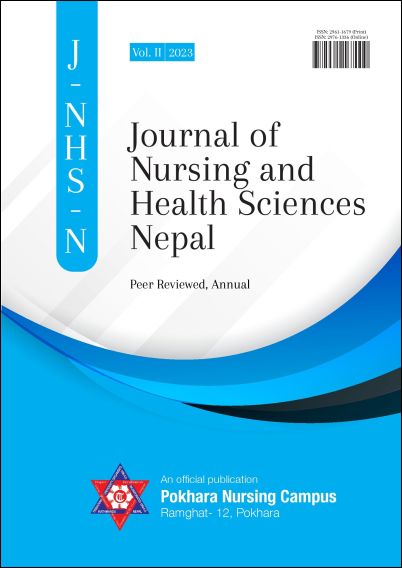Emotional and Behavioral Problems among School going Adolescents in Selected Schools of Pokhara: A Cross-Sectional Study
DOI:
https://doi.org/10.3126/jnhsn.v2i1.66464Keywords:
Adolescents, emotional and behavioral problems, SDQAbstract
Introduction: Adolescents are highly vulnerable to different types of emotional and behavioral problems and often have serious negative consequences for their academic achievement and potential social life. The main objective of the study was to assess the emotional and behavioral problems among school-going adolescents in Pokhara.
Methods: A descriptive cross-sectional study was conducted using the standard tool, Strengths and Difficulties Questionnaire (SDQ) among 305 adolescents studying in grades 8-10 of three randomly selected government secondary schools of Pokhara Metropolitan City through probability multi-stage sampling. Data was entered into the software EPI-DATA 3.1 and SPSS- 16 version was used for data analysis. Descriptive and inferential statistics (Chi-square test) were used to identify level of emotional and behavioral problems and to measure the association between emotional and behavioral problems, respectively.
Results: Results showed that 5.2 percent of adolescents got abnormal scores on Emotional and Behavioral Problems. On classification, 8.5 percent of adolescents have emotional problems. Likewise, 7.2 percent and 1.3 percent adolescents got abnormal scores on conduct problems and hyperactivity, respectively, which are considered as behavioral problems. Factors like sex, type of family, number of close friends, and hours spent with friends were found to be significantly associated with emotional and behavioral problems among adolescents.
Conclusions: Hence, it is concluded that emotional problems and peer relationship problems are common among girls, and hyperactivity and conduct problems are common among boys. An intervention strategy such as school-based mental health services might be beneficial to understand adolescents’ problems and providing appropriate counseling.
Downloads
Downloads
Published
How to Cite
Issue
Section
License
Copyright (c) 2023 The Author(s)

This work is licensed under a Creative Commons Attribution 4.0 International License.
This license enables reusers to distribute, remix, adapt, and build upon the material in any medium or format, so long as attribution is given to the creator. The license allows for commercial use.




